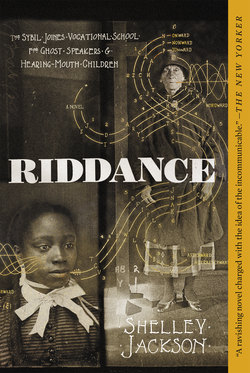Читать книгу Riddance - Shelley Jackson - Страница 13
На сайте Литреса книга снята с продажи.
Оглавление1. The Final Dispatch
Dictated by Headmistress Joines to Stenographer #6 (J. Grandison),
November 17, 1919
This remarkable document was dictated by Headmistress Joines from the land of the dead over the course of one long night, her last, through a transmitting device of her own invention. All expeditions to the netherworld were accompanied by a running commentary in this manner. Though often disjointed and equivocal, these dispatches not only provided invaluable data on unexplored regions of the necrocosmos, but were a mortal necessity for the necronaut, for whom the narrative thread was quite literally a lifeline.
Because we live in time, when we visit the land of the dead, we must carry our own time with us, or experience literally nothing and never even know we were ever there. Time is speech-time, according to Vocational School doctrine: We talk our way through the timeless land of the dead in a sort of bathysphere made of words, creating both ourselves and the landscape through which we move. In a very real sense the dispatch is the journey. This one was executed in haste, poor health, and emotional extremity, and in consequence, is more than usually disorienting. Only the hardiest and most experienced readers should risk it.
Although it conveys the impression of a single unbroken monologue, we know from the testimony of Joines’s stenographer and successor, Jane Grandison, that it was interrupted by intervals of silence of varying duration. Since silence is just as important as speech in Vocational School thought, I have given some thought to how I might reproduce its intervalling effect for readers who might flip flippantly through blank pages or other crude transliterations.
Eventually I decided to divide the dispatch into its longest continuous parts, interpolating other documents between them. It should be borne in mind, however, that they do make up a single unabridged transmission. Thus the ideal reader will read the entire book in one sitting, starting at about four in the afternoon, and will come to the end at about the same hour as the Headmistress came to hers. —Ed.
Borne on racing white-streaked black. Swirling to the glassy brink of the cataracts, then plunging in din and tumult so constant as to seem a kind of stillness. Around me others fall, so many as to seem like no one. We thunder down. Then smash against the fundament of the world. One smth smithereen, I flash past scenes too fleeting to collect. But someone is speaking, and as I recognize the voice, ground forms under my feet. The others stream on, forsaking me.
[Static.]
Are you receiving?
[Static, sound of breathing.]
Someone rises from the deluge. A bony big woman tented in mourning crepe and bombazine bothered all over with jet beads and netting. The great curved shield of her bosom has more of whalebone than of flesh behind it. The glossy carapace brings beetles to mind. An important personage. She is gripping a lorgnette and glaring about as if looking for someone.
A suspicion dawns on me that I am speaking of myself.
The personage opens her, my mouth. I am saying something. It is this, that I am saying something, which is this, that I am saying something, which is [several words indistinct]—
Stop.
Compose yourself.
Resume.
Say that my name is Sssss . . . Sybil Adjudicate Joines; that I am yet something short of two score and ten years old, my precise age being uncertain due to frequent prosecutions of what is, in effect, a kind of time travel; that I have worn crepe from the age of eleven and do not now expect to p-p-p-p-put it aside.
Please correct phonotactic violations.
Say that I am the headmistress of a vocational school, that I teach children with what were once known as speech impediments to channel the dead. Having been one myself, once. A child, that is. With a stutter. Say that the dead speak through me. Or let them say so, it’s all one. Say that I dispatch this message from the land of the did dad dead, where I have spent many pleasant hours. (They aren’t hours, there are no hours here, but we would be here all day, if there were days here, if I tried to explain how the lack of time drags on regardless.) Say that I live at the school with my students, that they are like family to me, which might sound agreeable if one did not know that my mother was hanged and my father burned alive.
Say that a child is missing.
[Static, sound of breathing.]
Are you receiving?
